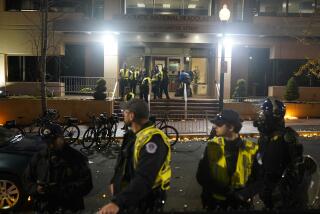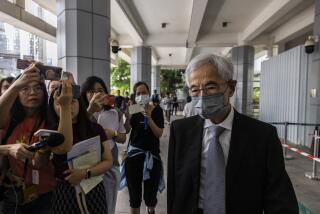Hong Kong clashes continue, raising concerns about casualties
Clashes between democracy protesters and police continued for a third day in a row Sunday in Hong Kong’s Mong Kok neighborhood, and leaders of both the government and the 3-week-old civil disobedience movement raised concerns that more casualties may ensue.
“The police have been put in a rather impossible position. They have an impossible job to do, maintaining law and order in the neighborhoods that have been affected,” Chief Executive Leung Chun-ying said in an interview with broadcaster ATV. Asked repeatedly if there would be a “violent crackdown” to end the demonstrations, Leung said: “I shan’t use the word ‘crackdown.’ ”
He said he wanted to bring the protests to a “peaceful and meaningful end.”
Leung added that “external forces from different countries” were participating in the demonstrations, but he refused to specify any foreign actors.
Police on Sunday again used pepper spray to disperse protesters. The local newspaper Mingpao reported that Hong Kong police have nearly used up their stocks of the spray and are primarily relying on batons now as the main instruments for crowd control.
Police said Sunday morning they arrested one man found with two knives in his backpack. The police said three protesters were injured and a police officer suffered a dislocated shoulder.
But protesters in Mong Kok reported a higher casualty count, saying 13 protesters were injured in the clashes, including seven with head injuries and two with bone fractures, according to Au Yiu-Kai, a physician and member of the protest group Occupy Central with Love and Peace.
“The police started to clear out the crowds around 12:30 a.m. and seven patients had head injures with blood bleeding down their faces,” Au said. “Three of them needed to call the ambulance.”
Au appealed to protesters to keep calm and not antagonize officers, and simultaneously asked police to keep promises to not use unnecessary force.
The democracy group League in Defense of Hong Kong’s Freedom, along with members from Occupy Central’s Finance and Banking Group, religious organizations and pan-democratic lawmakers condemned police for using what they called lethal force against protesters and called on officers to stop their “assertive” behaviors.
“Yesterday, we see the police hit the protesters with their baton, on their heads, arms and other important parts of their bodies. This is an unnecessary force that only is allowed to be used on very rare occasions,” said James Hon, a leader of the League in Defense of Hong Kong’s Freedom.
Hon warned that “the beating of the protesters can cause serious injuries, even deaths.”
Meanwhile, police said they had arrested a 23-year-old man on suspicion of encouraging people over the Internet to take part in “illegal assemblies” in Hong Kong’s Mong Kok and Admiralty districts, and to charge at the police.
In an attempt to calm protesters in Mong Kok, Occupy Central co-founder and sociology professor Chan Kin-man, as well as student leader Lester Shum, said talks and non-violent protests should be the only way for democracy demonstrators to express their views.
Hong Kong’s financial secretary, John Tsang, also wrote on his official blog that, with clashes now erupting frequently in Mong Kok, the Occupy Central movement has lost its “love” and “peace” elements. He called for participants in the protest movement to draw the line against people who use civil disobedience as an “excuse” to create conflicts.
The Hong Kong Federation of Students, one of the lead protest organizations, fought back against criticism that the occupation movement has spiraled out of control. There is unity of will among all protesters, the group said, and called those who suggested otherwise “irresponsible.”
A discussion between Federation of Students representatives and government officials is scheduled to be held Tuesday.
The federation said the group sees the dialogue as a way to express the views of the people of Hong Kong and said it was collecting opinions from demonstrators at different protest areas. The organization said it expects to have several rounds of talks and vowed not to retreat from any protest areas until the talks are concluded.
In his interview with ATV, Leung reiterated his position that the framework for the 2017 chief executive election, as put forth by the standing committee of China’s National People’s Congress, could not be modified.
Protesters say that the nomination process amounts to “fake democracy” because only two or three candidates can be approved by a nomination committee that they believe will be stacked with pro-establishment members.
Leung said that during Tuesday’s dialogue there would be room to discuss the composition of the committee and how its members would be selected.
But the Federation of Students again rejected the idea that the decision of the National People’s Congress is non-negotiable. Students have called for a more open nomination process.
“The NPC’s decision is why we started the protests in the very first place, and that is what Hong Kong people cannot accept,” said the group.
Special correspondent Hui reported from Hong Kong and Times staff writer Makinen from Beijing. Special correspondent Tiffany Ap in Hong Kong contributed to this report.Follow @JulieMakLAT for news from China
More to Read
Start your day right
Sign up for Essential California for news, features and recommendations from the L.A. Times and beyond in your inbox six days a week.
You may occasionally receive promotional content from the Los Angeles Times.







